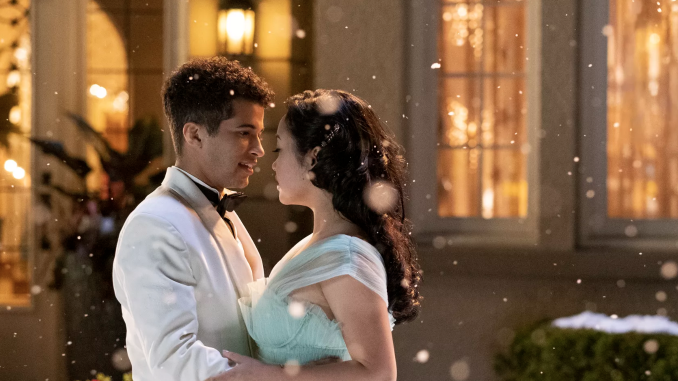
Dear world, high school romance is still a straights-only event. You’re young and gay? Aw. You want to see yourself represented on screen? That’s adorable. You want a happy ending? Love that energy — here’s more Noah Centineo. This is “To All the Boys: P.S. I Still Love You,” the sequel to the massively popular “To All The Boys I’ve Loved Before,” and it’s exactly what we’ve been asking for: another movie about straight teenagers, from the people who brought you every other movie about straight teenagers.
The story picks up not long after its predecessor ends. Lara Jean (Lana Candor), who’s characterization has shifted from “shy girl” to “girl with a little bit of confidence.” is reveling in her real relationship with Peter Kavinsky (Noah Centineo). There’s trouble in paradise though, because despite Lara Jean’s newfound kind-of confidence, Peter Kavinsky is still the most popular boy in school. He’s on the lacrosse team!
Then there’s the ever-looming threat of Peter’s ex, Gen — pronounced Jen, as in short for Jennifer, spelt Gen — who is desperate to get him back from Lara Jean. Gen is popular, Lara Jean isn’t … it’s only right! These truths, combined with the fact that Lara Jean has never been in a relationship before Peter, cause her to feel more and more self-conscious in the relationship as time passes.
Enter: John Ambrose (Jordan Fisher), the boy from middle school Model U.N. and recipient of one of Lara Jean’s letters. After appearing in a mid-credits scene (the existence of which has apparently been wiped from the “To All The Boys I’ve Loved Before” Cinematic Universe), John Ambrose is back, and no longer white! When we ask for diversity in film media, this is exactly what we we’re asking for.
John Ambrose is different than Peter; he’s smart, he wears his heart on his sleeve and his first interaction with Lara Jean wasn’t to tell her that he would never date her! This puts Lara Jean in a tough spot — will she remain loyal to Peter, who would probably move on in three to five business days should she dump him, or will she follow her heart and be with John Ambrose, whose name is uttered in it’s entirety throughout the film, so you know he’s a 17-year-old ready for committment.
It doesn’t help that Lara Jean is stuck working with John Ambrose at the nicest senior living facility ever captured on film, and that he’s being just as nice to her as he was in middle school. It’s at this point in the story that Lara Jean — who was actually a fairly fleshed out female protagonist in the first film — becomes an empty character, whose main function is to be so vague that any young viewer can place themselves in her shoes, planted firmly in the middle of the great “Peter or John Ambrose” decision. They might as well have changed her name to “y/n.”
It’s also at this point that what little momentum the story had completely dissipates. The character of Lara Jean has been completely lost, Peter is the same dull character he has been for the past two films, and John Ambrose’s sole personality trait is “nice.” The highs and lows that drag the film to its finale are uninteresting, and the ending itself comes and goes.
Honestly, mostly every scene in “P.S. I Still Love You” comes and goes. In editing, these scenes could have been rearranged in any given order, and it still would have worked. There’s no excitement in the plot, no emotional investment in the characters, and at all points, the stakes truly do not seem that high.
As Lara Jean, Condor is once again the sole standout performance. Though the material she’s been given is much worse, she still manages to be the rare gem in a film of deep mediocrity. Noah Centineo is bad, as always. No surprises there. There’s a reason he is not cast in any films besides Netflix teen romantic comedies. I would not be shocked to find out that he lives in a little room at Netflix’s headquarters, where he’s fed anti-aging pills and only brought out when a green-lit rom-com calls for a kind of douchey popular guy who comes around in the end.
The only people involved in making “P.S. I Still Love You” that deserve rights are the soundtrack curators who have great taste. The placement of the songs is consistently corny and tacky (see: Lara Jean’s “getting ready” montage set to Blackpink’s “Kill This Love”), but they’re still good songs.
While you would think that the most abrupt change from the first film would be the literal changing of a character’s race, it’s actually the changes that took place behind the camera that are to blame for the disconnect between the two. Michael Fimognari, who handled cinematography on both, took over from Susan Johnson as director. If you ever want to follow up a well-received movie with a mediocre-at-best sequel, replacing a female director with a man is the best way to go.
For what it’s worth, “P.S. I Still Love You” was the exact level of bad one would expect. “To All The Boys,” while no masterpiece, was unexpectedly delightful, perfect for a brief moment of escapism from our chaotic world — it’s sequel was never meant to live up to this. Rather, its goals were to make money for Netflix and keep eyes on Noah Centineo. Based on those standards, I suppose it’s yet another success for the company. Love, straight media.
